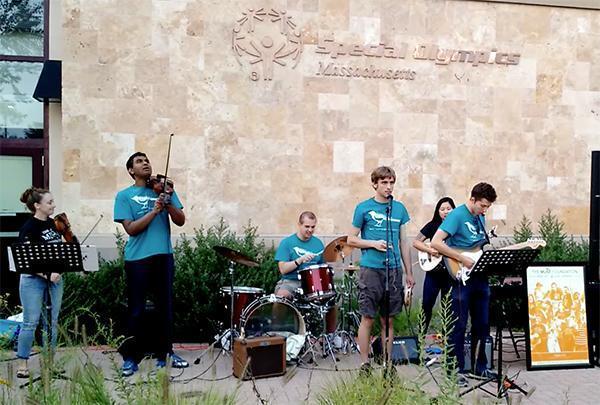Susan Senator
All happy families are not alike...
“Oh, your son’s autistic?” people ask me. I wait a beat for the predictable next question: “Have you tried …?” Always the implication that he needs help, poor thing. All of my son Nat’s life, people — well-meaning, of course — have sent me articles about the therapy of the month, the one thing that cured so-and-so. Nat’s now 28, and I have looked into so much that eventually I stopped looking. Nothing worked. I didn’t even know what “worked” meant. By the time Nat was a teen, all I wanted was to find something he liked to do.
The answer turned out to be sports, much to the surprise of our previously all-nerd family. But Special Olympics had it all for him — physical activity, adulation, and something new: friends. Many of the athletes were far older than Nat, and higher-functioning. They took him under their wings and shouted encouragement. The people and routines were the same year after year, and this eventually made him understand the concept and point of friendship — quite the revelation for my autistic young man.
The friend who meant the most to him was a young man named Sri. In addition to sports, Sri played the violin — in a rock band. Of developmentally delayed adults. Sri’s violin teacher, Elaine, and her wife, Miyabe, were the force behind the group, through a nonprofit they cofounded called the MUSE (Music, Unity, and Social Expansion) Foundation. I was intrigued, and envious of what Sri was doing. Nat had tried music therapy when he was younger. Like all of the other supposedly enriching, beneficial activities for autism, it was not for him. He would either space out or act out. So I’d closed the door on music.
But one night Sri’s family hosted a concert in their home. The parents were all in a great mood. The colorful living room filled with music, songs everyone knew: “Sweet Caroline,” “Let It Be,” “I’m a Believer.” The crisp — and loud — but poised and tuneful lead singer looked like a young Bob Dylan. A beautiful young woman played the keyboard. A friend from Special Olympics rocked out on the drums. But it was Sri who stole my heart. I was nearly moved to tears by his violin music, but even more so by his face, the way he stood. He looked so different. Confident. Deeply absorbed.
And Nat was riveted. I’d never seen him pay such close attention to other people. Afterward, during group pictures, Nat joined in as if he were one of them.
That was all Elaine needed to see; she asked Nat to try a drum right then and there. And just like that, he found a whole new universe. For the rest of the year, Nat played in the rhythm section — cowbell, which he handled with Will Ferrell-like enthusiasm, clunking away even during the solemn “Let It Be.”

In August, the band actually had a gig, at the Special Olympics Tournament of Champions. And Elaine was trying out a new singer: Nat. The sky that evening never seemed to get dark, as if it, too, were holding its breath in anticipation. The band began playing, and Nat leaned into the microphone, his smile as big as his head. He didn’t sing, exactly. It was more like a rap — with a lot of arm flapping. But you could really hear him. And to me, he was as charismatic as Mick Jagger.
To the rest of the audience, he was Nat, their Nat. His teammates sang along and filmed him with their phones. And I felt the tingling wonder of seeing my autistic son aware of the admiration of others. On that magical evening, Nat’s worlds collided, exploded. And from that, a (rock) star was born. And a stage mother.
Copyright 2017, Susan Senator